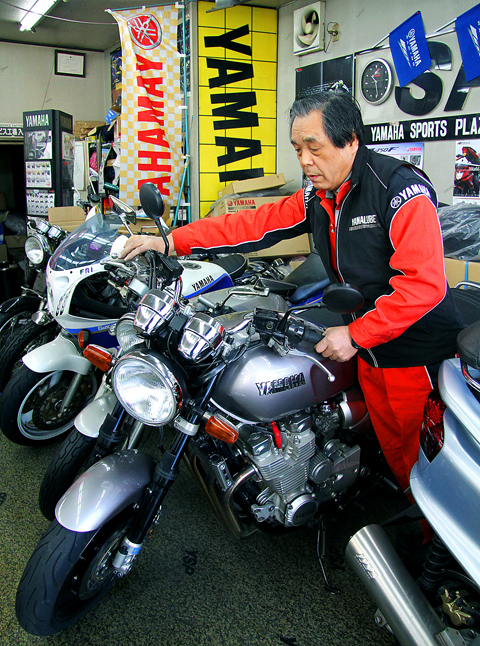Japanese motorcycle maker Yamaha Motor said yesterday it plans to close seven factories globally, shedding 1,000 jobs in an effort to recover from a US$2.4 billion annual loss.
Yamaha, the world’s second-biggest motorcycle manufacturer after Honda, said it would cut 200 jobs overseas, on top of the 800 in Japan announced last week.
The streamlining is in addition to a 10 percent reduction in the company’s global work force of 17,000 already under way, a Yamaha spokesman said.

PHOTO: BLOOMBERG
The group will shut five of its 12 domestic factories by 2012, all in Shizuoka Prefecture, which now produce parts for motorcycles, marine products and buggies.
Overseas, Yamaha will close a motorcycling factory in Italy and a marine products plant in the US state of Florida.
“The company is expanding the scope of three structural reforms — reorganizing the manufacturing layout, the work force and reducing costs — beyond the level envisioned in the previous announcement,” Yamaha said.
Yamaha said it suffered a net loss of ¥216.1 billion (US$2.4 billion) for the year to December, against a year-earlier profit of ¥1.8 billion.
Revenue dropped 28.1 percent to ¥1.15 trillion last year as the economic slump dented sales of motorcycles and marine products at home and overseas, Yamaha said.
For this year, the company expects to break even on a net basis, with solid demand in Asia projected to lift revenue by 8.4 percent to ¥1.25 trillion.
However, “demand in Europe and the United States is not expected to recover for some time,” it said. “Thus, sales conditions surrounding the Yamaha Motor Group are expected to remain harsh.”
Meanwhile, Japanese tiremaker Bridgestone said yesterday that it ended last year in the black, beating its own previous forecast for a loss, after cost cuts helped to offset a slump in sales.
Bridgestone posted net earnings of about ¥1 billion, based on preliminary results, down from a year-earlier profit of ¥10.4 billion but much better than its forecast of a ¥10 billion loss.
Revenue tumbled by about 20 percent to ¥2.59 trillion last year, it said.

With an approval rating of just two percent, Peruvian President Dina Boluarte might be the world’s most unpopular leader, according to pollsters. Protests greeted her rise to power 29 months ago, and have marked her entire term — joined by assorted scandals, investigations, controversies and a surge in gang violence. The 63-year-old is the target of a dozen probes, including for her alleged failure to declare gifts of luxury jewels and watches, a scandal inevitably dubbed “Rolexgate.” She is also under the microscope for a two-week undeclared absence for nose surgery — which she insists was medical, not cosmetic — and is

CAUTIOUS RECOVERY: While the manufacturing sector returned to growth amid the US-China trade truce, firms remain wary as uncertainty clouds the outlook, the CIER said The local manufacturing sector returned to expansion last month, as the official purchasing managers’ index (PMI) rose 2.1 points to 51.0, driven by a temporary easing in US-China trade tensions, the Chung-Hua Institution for Economic Research (CIER, 中華經濟研究院) said yesterday. The PMI gauges the health of the manufacturing industry, with readings above 50 indicating expansion and those below 50 signaling contraction. “Firms are not as pessimistic as they were in April, but they remain far from optimistic,” CIER president Lien Hsien-ming (連賢明) said at a news conference. The full impact of US tariff decisions is unlikely to become clear until later this month

GROWING CONCERN: Some senior Trump administration officials opposed the UAE expansion over fears that another TSMC project could jeopardize its US investment Taiwan Semiconductor Manufacturing Co (TSMC, 台積電) is evaluating building an advanced production facility in the United Arab Emirates (UAE) and has discussed the possibility with officials in US President Donald Trump’s administration, people familiar with the matter said, in a potentially major bet on the Middle East that would only come to fruition with Washington’s approval. The company has had multiple meetings in the past few months with US Special Envoy to the Middle East Steve Witkoff and officials from MGX, an influential investment vehicle overseen by the UAE president’s brother, the people said. The conversations are a continuation of talks that

CHIP DUTIES: TSMC said it voiced its concerns to Washington about tariffs, telling the US commerce department that it wants ‘fair treatment’ to protect its competitiveness Taiwan Semiconductor Manufacturing Co (TSMC, 台積電) yesterday reiterated robust business prospects for this year as strong artificial intelligence (AI) chip demand from Nvidia Corp and other customers would absorb the impacts of US tariffs. “The impact of tariffs would be indirect, as the custom tax is the importers’ responsibility, not the exporters,” TSMC chairman and chief executive officer C.C. Wei (魏哲家) said at the chipmaker’s annual shareholders’ meeting in Hsinchu City. TSMC’s business could be affected if people become reluctant to buy electronics due to inflated prices, Wei said. In addition, the chipmaker has voiced its concern to the US Department of Commerce